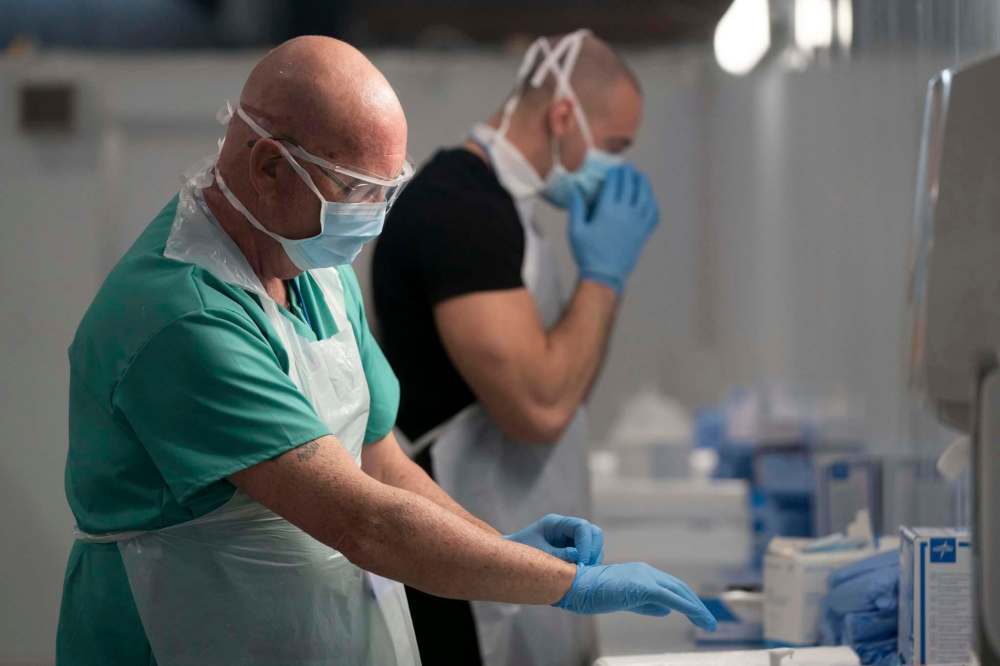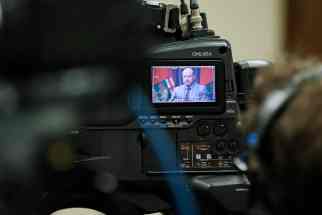Province masking reality of PPE availability
Read this article for free:
or
Already have an account? Log in here »
To continue reading, please subscribe:
Monthly Digital Subscription
$0 for the first 4 weeks*
- Enjoy unlimited reading on winnipegfreepress.com
- Read the E-Edition, our digital replica newspaper
- Access News Break, our award-winning app
- Play interactive puzzles
*No charge for 4 weeks then price increases to the regular rate of $19.00 plus GST every four weeks. Offer available to new and qualified returning subscribers only. Cancel any time.
Monthly Digital Subscription
$4.75/week*
- Enjoy unlimited reading on winnipegfreepress.com
- Read the E-Edition, our digital replica newspaper
- Access News Break, our award-winning app
- Play interactive puzzles
*Billed as $19 plus GST every four weeks. Cancel any time.
To continue reading, please subscribe:
Add Free Press access to your Brandon Sun subscription for only an additional
$1 for the first 4 weeks*
*Your next subscription payment will increase by $1.00 and you will be charged $16.99 plus GST for four weeks. After four weeks, your payment will increase to $23.99 plus GST every four weeks.
Read unlimited articles for free today:
or
Already have an account? Log in here »
Hey there, time traveller!
This article was published 17/04/2020 (2062 days ago), so information in it may no longer be current.
On Friday, Manitoba’s provincial government announced it was devoting another $300 million to front-line pandemic needs, including the purchase of “significant amounts” of personal protective equipment (PPE) needed to protect health-care workers and help stem the spread of COVID-19. That’s an impressive pledge, albeit one based on a misleading premise.
Despite efforts by the Progressive Conservative government and public-health officials to deny what was happening, Manitoba is facing a critical shortage of PPE. When questioned, Shared Health Manitoba officials have downplayed concerns about the province’s stockpile of masks, gowns, gloves and hand sanitizer by pointing out that this province was the first to place an order with the federal government’s central pandemic procurement effort.

This, Premier Brian Pallister assured the province, was evidence that Manitoba is the “most prepared” province in the country. What has subsequently become apparent is that being the first to place an order was no guarantee that Manitoba would receive everything it requested.
Last week, Shared Health finally admitted that after ordering “millions” of dollars of PPE, Manitoba was only receiving “thousands” of dollars of actual protective equipment. Our supplies of gowns, N95 masks (which provide the highest level of protection for health-care workers) and hand sanitizer are dangerously low. Gloves, surgical masks and eye protection supplies are in better supply, but still declining.
This admission reveals a contradiction contained in Friday’s announcement. The shortage of PPE is not related to spending; it is a reflection of the fact there is a global shortage of this equipment, and what supplies are coming into Canada are going, correctly, to the provinces that need them the most. Given Manitoba’s success to date at limiting the virus’s spread, we’re not the province of greatest need — at least, not right now.
Manitoba can hardly be faulted — in fact, should be applauded — for being one of the least-affected provinces. But it can be criticized for making misleading claims about our level of preparedness.
Even as politicians and public-health officials were denying there was a problem, there were signs that PPE was actually in short supply: public appeals for donations of PPE; rapid requests for local industry to re-tool to produce masks, gowns and hand sanitizer; guidelines for the use of PPE that dictated the re-use of certain kinds of masks.Manitoba can hardly be faulted– in fact, should be applauded — for being one of the least-affected provinces. But it can be criticized for making misleading claims about our level of preparedness.
Now, Manitoba finds itself in an awkward dilemma: desperate enough to issue broad, public pleas for PPE donations, but too tight-lipped to admit the magnitude of the problem. That is not a winning strategy to meet a pressing public-health need.
The province’s reluctance to be transparent about its PPE supplies now puts Manitoba in a very difficult position: one of the reasons we have been relatively successful at containing the COVID-19 outbreak has been the effective use of PPE in health-care facilities. However, as those supplies are reduced, so, too, is our capacity to contain the virus.
Currently, health-care workers in personal care homes and other non-hospital facilities, as well as community-based physicians working in private clinics, are having trouble getting PPE they need to protect themselves against the virus. That is a troubling scenario, made worse by the provincial government continuing to create the impression that if a problem exists, it can be solved by spending more money.
More money does not guarantee more PPE. The province and public-health officials should, at the very least, be up-front about the reality of PPE availability. False hope won’t protect anyone from anything.








